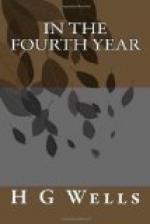a matter for speculation whether my member is arguing
that a caucus
can rig an election carried on
under the Proportional Representation system or that
it cannot. At the first blush it seems to read
as if he intended the former. But be careful!
Did he? Let me suggest that in that last sentence
he really expresses the opinion that it cannot.
It can be read either way. Electors under modern
conditions are not going to obey the “orders”
of even the “most drastic caucus”—whatever
a “drastic caucus” may be. Why should
they? In the Birmingham instance it was only
a section of the majority, voting by wards, in an
election on purely party lines, which “obeyed”
in order to keep out the minority party candidate.
I think myself that my member’s mind waggled.
Perhaps his real thoughts shone out through an argument
not intended to betray them. What he did say as
much as he said anything was that under Proportional
Representation, elections are going to be very troublesome
and difficult for party candidates. If that was
his intention, then, after all, I forgive him much.
I think that and more than that. I think that
they are going to make party candidates who are merely
party candidates impossible. That is exactly what
we reformers are after. Then I shall get a representative
more to my taste than Mr. Burdett Coutts.
But let me turn now to the views of other people’s
representatives.
Perhaps the most damning thing ever said against the
present system, damning because of its empty absurdity,
was uttered by Sir Thomas Whittaker. He was making
the usual exaggerations of the supposed difficulties
of the method. He said English people didn’t
like such “complications.” They like
a “straight fight between two men.”
Think of it! A straight fight! For more
than a quarter-century I have been a voter, usually
with votes in two or three constituencies, and never
in all that long political life have I seen a single
straight fight in an election, but only the dismallest
sham fights it is possible to conceive. Thrice
only in all that time have I cast a vote for a man
whom I respected. On all other occasions the
election that mocked my citizenship was either an
arranged walk-over for one party or the other, or
I had a choice between two unknown persons, mysteriously
selected as candidates by obscure busy people with
local interests in the constituency. Every intelligent
person knows that this is the usual experience of
a free and independent voter in England. The “fight”
of an ordinary Parliamentary election in England is
about as “straight” as the business of
a thimble rigger.




